The Shrike
Brief Synopsis
Cast & Crew
Jose Ferrer
Jose Ferrer
June Allyson
Joy Page
Kendall Clark
Isabel Bonner
Film Details
Technical Specs

Synopsis
After overdosing on phenobarbitals, theater director Jim Downs is brought to a New York psychiatric hospital by his doting wife Ann. After she informs the doctors that she and her husband are currently separated, Dr. Barrow asks her why Jim is calling out the name Charlotte, and Ann becomes agitated. Explaining that Jim will reveal his true feelings in his half-conscious state, Dr. Barrow wakes Jim, who moans that he does not love Ann and wants only to die. After a few days, Jim has revived, and reacts with enthusiasm to Ann's news that a theater has called with a project for him. Before he can leave, however, he is examined by another psychiatrist, Dr. Schlesinger, and after Jim describes the despair at his poverty that drove him to attempt suicide, the doctor insists he stay in the hospital for an undetermined length of time. Outside, meanwhile, Ann refuses to allow Charlotte Moore, Jim's lover, to visit. The next day, Ann and Jim are interviewed together, and upon learning that he can only be released into her care, Jim grows upset and refuses to leave with her. He is transferred to Ward F, where patients Carlos O'Brien, John Ankoritis, Major and Schloss discuss the dreaded Ward 7, where violent offenders are placed. Although Jim grows more and more desperate to leave, a nurse informs him that he bears the burden of proving he is sane. With his new doctor, Bellman, Jim begins to sort through his history with Ann: They meet and marry when he is a stage manager and she an understudy, and with her consistent support and faith in his talent, Jim is soon promoted to director. Ann acts in his first production, and both receive stunning reviews. Their romance blossoms, but when Jim soon needs to cast big stars in his productions, Ann grows jealous and manipulative. They move to a large apartment and Ann becomes pregnant, but after Jim once again cannot provide her with a role in his next play and Ann miscarries, she grows despondent and withdraws. Soon, her life revolves only around Jim, and although she urges him to take a trip to London alone, she swears never to be apart again. During Jim's next production, Ann begins to give creative notes to the playwright, and the play flops. His career continues to suffer over the next few years, and the more that Ann tries to get involved, the more the press insinuates that Jim has no control over his directing. He asks her to visit her parents for a while, but after she leaves, Jim loses his confidence and fails once again. In his next play, he casts Charlotte, an unknown, and his head is turned by her talent and belief in him. At home, Ann subtly suggests that Jim should give up theater and work for her father and, furious, he walks out and never returns. Back in the doctor's office, Bellman declares that Jim must continue his treatment, causing Jim to miss his job interview. Bellman later confides in his nurse that he suspects Ann is like a shrike, a female bird that uses her sharp beak to contain and eventually impale her victims. Back in the ward, Jim watches as Schloss, a bigot, lies to the nurse that Carlos threatened him, and a terrified Carlos is sent to Ward 7. Charlotte sends a telegram, read to Jim by the nurse, informing him that Ann will not allow her to visit, and the nurse conjectures that Jim must leave Charlotte if he wants Ann's permission to leave the hospital. When Ann visits the next day, Jim rages about the hospital's tight control over his every move and begs her to put the past to rest. Ann responds by asking if Charlotte is in the past, too, and Jim's outburst almost dooms him to Ward 7. Later, Jim's brother Harry visits and advises him to swallow his pride for the next ten days, pretending to be a loving husband and model patient. Harry asks about Charlotte, and Jim confesses to his affair: After leaving Ann, Jim bumps into Charlotte, who remains encouraging and inspires him to try directing again. They fall in love, but he cannot muster the courage to divorce Ann, and when he completely runs out of money, he feels hopeless and attempts suicide. Soon after Harry leaves, Jim begins to feign contrition, agreeing to Ann's demand to write a letter to Charlotte, swearing that the affair is over. Bellman then calls Ann in to his office and questions her about her marriage, but after he implies that Ann's jealousy of Jim's work has made her want to turn him into a dependent child, she leaves in a fury. Jim's hospital stay is soon over, and he lies to the doctors' committee that he will return to Ann and take a job with her father. They release him, and he calls Ann to pick him up, crying. When she arrives, however, she reveals that Bellman has made her realize that she has been hurting Jim, and offers to leave him. Seeing that they both contributed equally to their problems, Jim states that they must work for their own happiness, and asks an elated Ann if they can try again.

Director

Jose Ferrer
Cast

Jose Ferrer
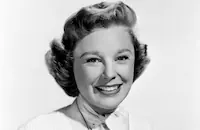
June Allyson

Joy Page
Kendall Clark
Isabel Bonner
Will Kuluva
Joe Comadore
Billy M. Greene
Leigh Whipper

Richard Benedict
Mary Bell
Martin Newman
Herbie Faye
Somer Alberg
Jay Barney
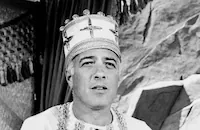
Edward Platt
Fay Morley
Jacqueline De Wit
Adrienne Marden
Tom Cound

Dani Crayne
Doug Henderson
Helen Beverly
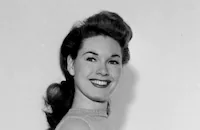
Shawn Smith
Donald Murphy
Dee Carroll
Joanne Jordan
Jane Buchanan
Stafford Repp
Nancy Kulp
Jeanne Tatum
Eda Reiss Merin
Sara Seeger
Kenneth Drake
Paul Mcguire
Bruce Carlisle
Elora Drake
Vernon Rich
Jack Baston
Hugh Lawrence

Nicky Blair
Eddie Gomez
Henry Dar Boggia
George Nardelli
Pauline Moore
Judith Brian
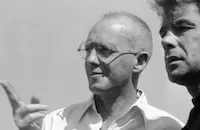
John Farrow
Voltaire Perkins
Jean Fenwick
Lisabeth Fielding
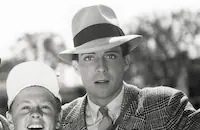
Dennis Moore
Charles Phillips
Crew
Saul Bass
Leslie I. Carey
Leon Charles
Leon Charles
Edward Dodds
Ketti Frings
Russell A. Gausman
Joseph Gershenson
Alexander Golitzen
Frank Gross
Corson Jowett
Ruby R. Levitt
Art Marks
Jay A. Morley Jr.
Richard H. Riedel
Aaron Rosenberg
John Sherwood
Frank Skinner
Joan St. Oegger
Bud Westmore

Film Details
Technical Specs

Quotes
Trivia
Notes
According to a February 1952 NYT news item, screen rights to The Shrike, Joseph Kramm's Pulitzer Prize-winning play, incited a bidding war between Paramount, Twentieth Century-Fox and M-G-M. In late October 1952, a Hollywood Reporter news item announced that Ida Lupino would co-star with José Ferrer and that Lupino and her then husband, Collier Young, would produce for RKO. In September 1953, Los Angeles Herald Express reported that Ferrer, who had produced, directed and starred in the play on Broadway, was teaming with Columbia to direct the film version. The Shrike marked Ferrer's feature film directorial and producing debut. As noted in studio press materials, most of the film's actors also appeared in the play, including Kendall Clark and Somer Alberg. Although the play ends on a dour note, promising no hope for "Jim" and "Ann," writer Ketti Frings added the film's more positive conclusion, described by studio press materials as "completely in keeping with the wider screen horizons."
Critics praised June Allyson's performance, noting that the role provided the actress with her first opportunity to play an unsympathetic character. Most of the film was shot on location outside Times Square and in the Bellevue psychiatric hospital in New York City. October 1954 HR news items add Helen Spring to the cast, but her appearance in the released film has not been confirmed. The Shrike marked the only film performance for Isabel Bonner, the wife of playwright Kramm. Bonner, who played both "Dr. Barrow" and "Ann Downs" on Broadway, died of a brain hemorrhage on July 15, 1955 while performing in the play in Los Angeles.

Miscellaneous Notes
Released in United States 1955
Feature directorial debut for Jose Ferrer.
The play on which the film is based won the Pulitzer Prize.
Released in United States 1955











